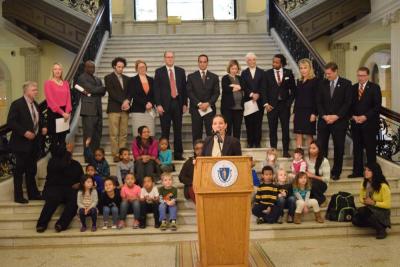January 22, 2015
 State Sen. Sonia Chang-Diaz discusses her pre-K bill on the Grand Staircase at the State House. Photo courtesy Sen. Chang-Diaz’s office
State Sen. Sonia Chang-Diaz discusses her pre-K bill on the Grand Staircase at the State House. Photo courtesy Sen. Chang-Diaz’s office
A gaggle of three- and four-year-olds fidgeted while sitting on the steps of the Grand Staircase at the State House late Tuesday morning. In front of them: a podium, with state Sen. Sonia Chang Diaz speaking to reporters. The Jamaica Plain legislator, whose district includes pieces of Dorchester and Mattapan, was rolling out one of the first major proposals of the year: a bill establishing universal pre-kindergarten state-wide.
By the close of last Friday’s filing deadline, 200 senators and representatives had filed 5,333 bills, many of which will die or else be amended if they make it to Gov. Charlie Baker’s desk. Dorchester’s delegation – Reps. Evandro Carvalho, Dan Hunt, Russell Holmes, and Dan Cullinane and Senators Linda Dorcena Forry and Chang-Diaz – accounted for 113 of the bills. Hunt led the pack with 26, followed by Dorcena Forry and Chang-Diaz at 25 each, Holmes and Cullinane at 13 apiece, and Carvalho at 11.
A major bill filed by Dorcena Forry would require police officers to issue tickets when stopping individuals on the street, noting the reason, location, and time of the stop, all of which information will be used to collect data statewide. “We need these cities and towns to focus and look at their own communities and see their own practices,” she told the Reporter on Wednesday. “This is not a Boston problem.”
Another of her bills would pursue in-state college tuition for Massachusetts high school graduates who have attended at least three years of high school in the commonwealth, opening the door for undocumented immigrants already living in Massachusetts to pay the significantly less expensive in-state fees.
Carvalho said he was inspired by the events in Ferguson, Missouri, to file a bill that would require the governor to appoint a special investigator to prosecute officer-involved killings and another that would require the state’s police departments to publish their guidelines for the use of deadly force. The deadly force bill would also call for a study into establishing state-wide best practices for the tactic. “ I think it’ll at least create a uniform way to determine a crucial life or death situation,” the former prosecutor said on Wednesday.
One bill by Hunt, would commission a study by the Office of Housing and Economic Development into potential public-private partnerships expanding business district parking within urban areas – a well-documented problem in Savin Hill, among other parts of the city. Another proposal by Hunt would see a new building at UMass Boston – “General Academic Building 2” – named after the late George V. Kenneally, Jr., a longtime representative and senator from Dorchester who played a key role in bringing UMass Boston to Columbia Point. “We haven’t fully recognized his commitment to the university,” Hunt said on Tuesday. “I would argue this recognition is long overdue.” The building is expected to be completed next year.
Another study proposed by Hunt would look into aggressive panhandling and report to its findings to the Legislature within a year. “People should be able to ask for money but they shouldn’t be able to trample on public areas or come into a public way to do it,” he said.
Dan Cullinane laid out a baker’s dozen of bills, prioritizing, he said on Tuesday, his constituents’ biggest concerns while trying not to spread himself too thin. One of them would mandate that all imitation firearms sold in Massachusetts be painted orange – beyond the orange tip for the imitation guns in stores and on the streets here now.
“All these imitation firearms look and feel and seem like a lethal firearm,” he said. “In my opinion, manufacturers know exactly what they’re doing and selling. They are the same color and have the same action slide.” This legislation would not only protect consumers, Cullinane said, but also police officers. “They don’t have the time or luxury to see that little orange tip. We owe it to them to make this change.” Cullinane added that because the bill only applies to imitation firearms, it would avoid the lengthy process fraught with emotions dredged up during last session’s gun control package by House Speaker Robert DeLeo.
Cullinane is also pursuing a “simple” step in the Criminal Offender Record Information (CORI) system: a law requiring a packet of information on the CORI system to be applied to all inmates before their release. “Transparency with information about the system in which the person is participating is essential. Best time to do that is before they walk out the door,” Cullinane said. “It’s pretty cut and dry.”
Back on the steps in the Great Hall, Rep. Carvalho stood behind Chang-Diaz and the fidgeting tykes. He is one of the pre-K bill’s key co-sponsors, a way to indicate a bill’s support in the Legislature ahead of a vote. Legislators can, and do, co-sponsor hundreds of bills during a session. “But the amount of co-sponsors does not necessarily guarantee a bill’s success,” Hunt said.
The Dans of Dorchester both called their bills “common sense,” the direct result of months spent at community meetings throughout their districts. This is not the only time that legislators can author bills; emergencies such as last year’s up-skirting bill, speedily crafted in response to a Supreme Judicial Court ruling, made its way through the State House at breakneck speed. But that is not everyday business on Beacon Hill.
“Because of the overwhelming volume, it’s hard to get the common sense bills passed,” Hunt said, adding he hopes to use his experience to “leverage those relationships to try and get these more obvious bills through over the next two years.”
Topics:


